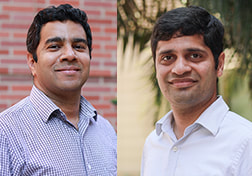LOS ANGELES, CA - A team of electrical and computer engineering professors, including two of Indian Americans, from the University of California, Los Angeles, has received a $5.9 million research grant from the U.S. Department of Defense to develop energy-efficient computing systems that can process massive amounts of data at speeds much faster than currently possible, according to a press release.

Professors Sudhakar Pamarti and Puneet Gupta, experts in nanotechnology, computing systems, design automation and integrated circuit design, are working on a project to address what is called the “memory bottleneck,” where computing speeds go down as information is shuttled between memory and processing chips.
The grant is from the Defense Advanced Research Projects Agency, and is part of a larger effort, called the Electronics Resurgence Initiative, to solve fundamental challenges in computing and microelectronics to help continue Moore’s Law – which has successfully predicted the continual shrinking of transistors for microelectronics over the past five decades, according to the March 19, press release from the UCLA Samueli School of Engineering and Applied Science.
According to the UCLA Samueli School of Engineering, through this “revolutionary technology” called Spintronic Stochastic Dataflow Computing, the research team aims to demonstrate a reduction in energy use of 60 times less than current technologies in data-intensive computer tasks such as machine learning.
Parmarti, a graduate of the Indian Institute of Technology, Kharagpur, and a Ph.D. in electrical engineering from UC San Diego, is associate professor and area director, Circuits & Embedded Systems at UCLA School of Electrical and Computer Engineering.
The grant is from the Defense Advanced Research Projects Agency, and is part of a larger effort, called the Electronics Resurgence Initiative, to solve fundamental challenges in computing and microelectronics to help continue Moore’s Law – which has successfully predicted the continual shrinking of transistors for microelectronics over the past five decades, according to the March 19, press release from the UCLA Samueli School of Engineering and Applied Science.
According to the UCLA Samueli School of Engineering, through this “revolutionary technology” called Spintronic Stochastic Dataflow Computing, the research team aims to demonstrate a reduction in energy use of 60 times less than current technologies in data-intensive computer tasks such as machine learning.
Parmarti, a graduate of the Indian Institute of Technology, Kharagpur, and a Ph.D. in electrical engineering from UC San Diego, is associate professor and area director, Circuits & Embedded Systems at UCLA School of Electrical and Computer Engineering.

 RSS Feed
RSS Feed
